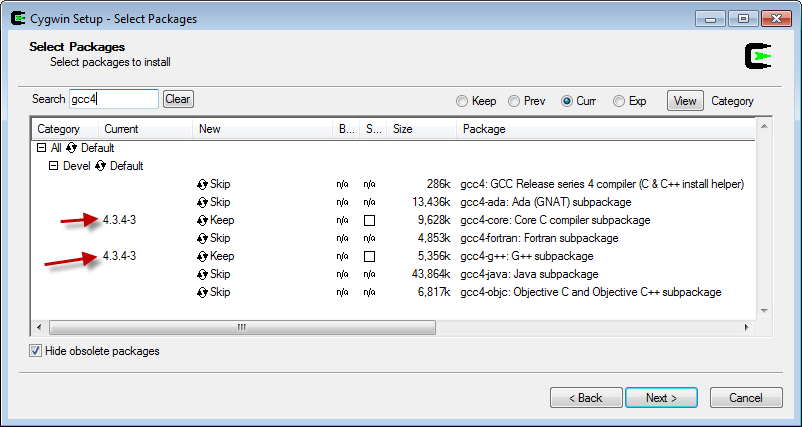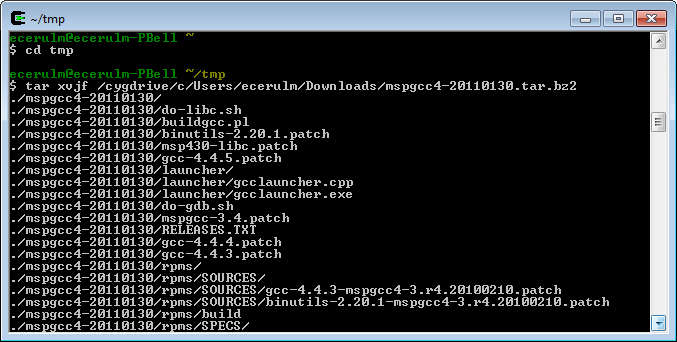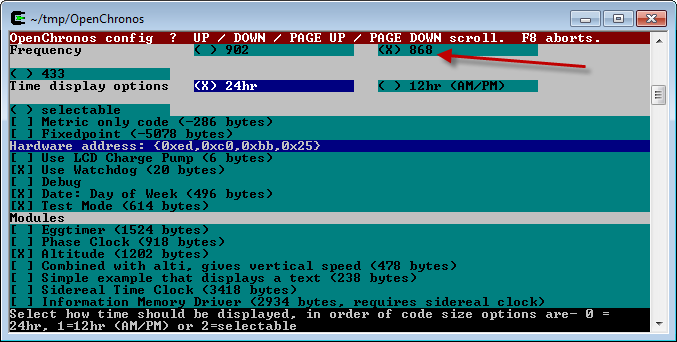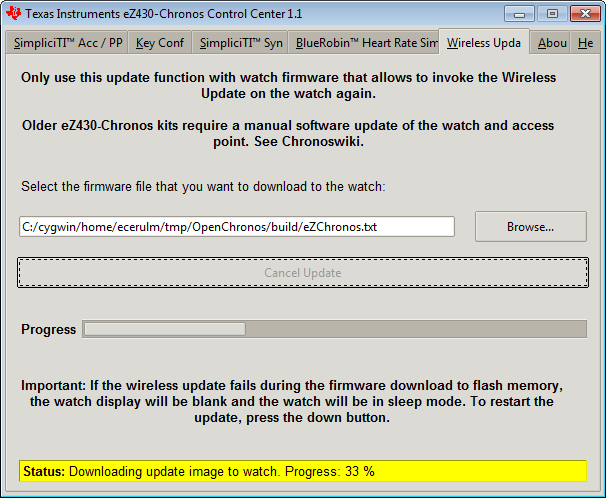I got the EZ430 Chronos some days ago and after play around a little with the Code Composer Studio v4 that comes with it (the free code size limited version) I got the TI firmware compiled and uploaded to the watch. Then I realized that what I compiled it was a stripped down version of the firmware called Limited as the code-size-limited CCSv4 cannot be used to compiled the Unrestricted firmware.
So now to get a decent firmware in the EZ430 I need either the full CCSv4 or another toolchain for the MSP430 MCUs with specific support for CC430F6137 which is the processor present in the eZ430-Chronos . CCSv4 is quite expensive: ~500USD so I started looking for other toolchains.
I tried mspgcc but it didn’t really work for me. I was getting compilation errors, and I didn’t feel like investigating those. Then I turn into OpenChronos which seems to be the TI firmware but just modified enough to be able to compile using the mspgcc4 toolchain so I started exploring that path.
I couldn’t get the Win32 port of mspgcc4 to work properly (seems to me that the Win32 has been updated in a while). So at the end I had to use it from Cygwin . These are the steps that I took:
-
Install wget, patch, gcc 4 , make, python and perl in Cygwin

-
Download the source distribution of mspgcc4
-
Unpack it inside a Cygwin bash shell
cd tmp tar xvjf /cygdrive/c/Users/xxxx/Downloads/mspgcc4-20110130.tar.bz2
-
Build mspgcc
cd mspgcc4-20110130 ./buildgcc.plSelect gcc-4.4.5, no gdb, no insight, ti_20110130, and the rest of the defaults.
-
After a long compile mspgcc4 should be installed in /opt/msp430-gcc-4.4.5/
-
Add
export PATH=$PATH:/opt/msp430-gcc-4.4.5/binto~/.bashrc -
Download OpenChronos
cd ~ git clone git://github.com/poelzi/OpenChronos.git Cloning into OpenChronos... remote: Counting objects: 1485, done. remote: Compressing objects: 100% (550/550), done. remote: Total 1485 (delta 972), reused 1364 (delta 877)Receiving objects 93% Receiving objects: 100% (1485/1485), 666.11 KiB | 411 KiB/s, done. Resolving deltas: 100% (972/972), done. -
Configure the build cd OpenChronos make config
-
Select the proper frequency (868Mhz if you are in Europe) and save

-
Run make
make Assembling even_in_range in one step for MSP430... msp430-gcc -D_GNU_ASSEMBLER_ -x assembler-with-cpp -c even_in_range.s -o even_in_range.o Compiling main for MSP430... msp430-gcc -mmcu=cc430x6137 -Os -Wall -fomit-frame-pointer -fno-force-addr -finline-limit=1 -fno-schedule-insns -Wl,-Map=output.map -o build/eZChronos.elf logi ... ... ... ronos.o gcc/intrinsics.o even_in_range.o Convert to TI Hex file python tools/memory.py -i build/eZChronos.elf -o build/eZChronos.txt ELF section .text at 0x8000 32224 bytes ELF section .data at 0xfde0 150 bytes ELF section .vectors at 0xff80 128 bytes convert to TI Hex -
Upload the new compiled firmware
build/eZChronos.txtusing the Wireless update feature of Chronos Control Center (you have to have the USB access point connected, of course)- Select the firmware file
c:/cygwin/home/xxxxxx/OpenCronos/build/eZChronos.txt - Click on Update Chronos Watch button
- In the watch, navigate to rFbSL (using the
#button) and start it (by holding#). If everything goes at it should the download will start and you will see the percentage of firmware tranferred so far in the watch screen (also in Chronos Control Center).
- Select the firmware file
If you think that there is something missing or not clear, leave a comment.